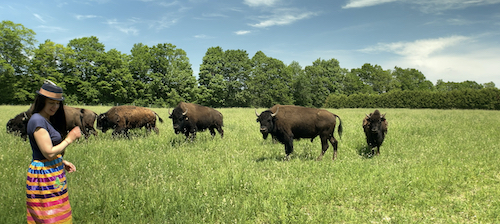
Presented by Nimikho Productions at the 2021 Virtual Toronto Fringe Festival, kiskisiwin nimihko (remembering my blood) chronicles the resilience, pain, and defiant joy of a Métis/Nehiyaw woman and her family in the face of colonialist brutality.
Writer PJ Prudat’s 30-minute monologue is a cry from the heart. It’s family lore and cultural ode, storytelling and memory as rebellion, and, most importantly, a way to “no longer be invisible.” It is relevant, required viewing.
(Content warning: this show, and therefore this review, mentions violence against Indigenous culture and bodies by settlers and colonizers.)
Prudat begins the show as a conversation with a friend over speakerphone in her car. As she roars down the road toward forest and stream, she tells the story of the “bonepickers” — Indigenous people forced to clear the plains of the bodies of the black buffalo after the British created starvation conditions by slaughtering their main form of sustenance by the millions. Telling a story familiar to her but forgotten by many, her voice shakes with anger, and her words are stark.
When the car journey fades to black, most of the rest of the show is delivered in voice over, which accompanies shots of Prudat in natural settings. Though Prudat’s delivery is consistently strong throughout, I admit that the scenes where she actively spoke on screen were particularly powerful, and I wished there had been more of them.
The daughter of a Métis mother, from whom she was taken, and a Cree second-dad, Prudat tells their stories. She addresses them to her ancestors, particularly her çapan (third great-grandmother), Catherine. Her words are poetic and cutting. Her mother never stopped loving her children, “even when it might have been easier.” Her second-dad, a survivor of the terrors of Residential Schools, was re-traumatized by having to repeat his story over and over in the hope being believed enough to receive a monetary settlement.
Providing a background to these stories is that of Maxime, a Riel councilman charged with treason, and çapan Catherine, who were involved in the 1885 Battle of Batoche. Each tale is brief, but weaves together to form a garment of memory, violently torn to shreds, but patched anew.
Videographer Chala Hunter’s carefully-chosen settings and shots communicate a strong sense of place. Prudat dances defiantly in front of woods roped off by caution tape in a beautiful ribbon skirt with animal figure appliqué, sarcastically wearing a large black top hat. When she muses about her grandfather’s bones by the shore of the south Saskatchewan river, she appears almost to walk on the water that laps at the rocks. Most impactful are shots of a live herd of bison — a curious calf and Prudat regard each other, suggesting hope for a new beginning.
Descriptions of sacred objects and ornaments add meaning and metaphor to Prudat’s description of her family’s connections. She refers to the “beadwork of our inner cellular constellations,” with each tiny cell a “bead in time.” When she mentions donating her marrow and stem cells to her brother, she compares it to the gift of a Métis octopus firebag, made and beaded by Métis women, “proud pieces used to carry flint and steel, tobacco and pipes for ammunition.”
These descriptions, which envision the beadwork of blood and marrow as both a part of the self and a gift freely given to each other, viscerally contrast with the story of the British using stolen, slaughtered buffalo bones to create the fine china that proclaimed their status and class.
Even Prudat is not completely confident; though fiercely influenced by her heritage, she remains forcibly removed from it. I was deeply moved when she wonders, after everything she’s done, if she’s actually getting things right. It’s a moment of vulnerability that reminds us that no-one has all the answers.
Prudat speaks to the concept of “dreaming forward,” remembering the good in order to heal over. This is a show about pain, but it’s also about joy, and finding home in any way you can. It’s a shame that remembering the good is often in short supply for a traumatized people, forced to tell and retell their painful stories in the hope that this might be the day they are finally heard. This time, we can turn off the Olympics for half an hour, and listen.
Details
- kiskisiwin nimihko (remembering my blood) is playing on-demand at the Virtual 2021 Toronto Fringe Festival.
- Purchase a $5 Membership to access the On-Demand programming on the Fringe website, then Pay What You Can to each show as you go, with the suggested price of $13 per show.
- Memberships can be purchased here. View the virtual on-demand show listings here.
- Accessibility notes:
- On-Demand shows: videos are closed captioned, transcripts are available for all audio content, documents are screen-reader friendly, and all digital images are provided with alternative text descriptions. These access supplements have been generated by the company and reviewed by the Festival. They may vary slightly from company to company.
- Fringe Primetime presentations will feature Auto-Transcribed Captioning.
- Content warning: This show is not recommended for persons under 14 years of age. It features mature language, abrupt cues, and speaks to colonial violence.
- Read all of Mooney on Theatre’s 2021 Virtual Toronto Fringe Festival coverage here.
Photo of PJ Prudat by Chala Hunter.
